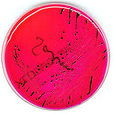Bacterial Fingerprint
The “bacterial communities” that live on human skin are now thought to form colonies on inanimate objects regularly touched by human hands, such as your computer keyboard. These bacterial fingerprints have been discovered by microbiologists Rob Knight and Noah Ferrier of the University of Colorado, Boulder after researchers swabbed three different keyboards and nine mice for bacteria. They then compared the genomic variations between the different communities and thereby identified whose hands had been touching what. “The results demonstrate that bacterial DNA can be recovered from relatively small surfaces, that the composition of the keyboard-associated communities are distinct across the three keyboards, and that individuals leave unique bacterial ‘fingerprints’ on their keyboards,” wrote Knight and his colleagues at the University of Colorado, Boulder in a new paper in the Proceedings of the National Academy of Sciences. This is just the latest discovery in a new branch of research called microbiome science which looks at the complexity of bacteria living in a variety of different human ecosystems such as the gut, saliva and skin.



